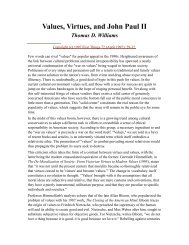Person-centred coaching psychology: A meta-theoretical perspective
Person-centred coaching psychology: A meta-theoretical perspective
Person-centred coaching psychology: A meta-theoretical perspective
You also want an ePaper? Increase the reach of your titles
YUMPU automatically turns print PDFs into web optimized ePapers that Google loves.
<strong>Person</strong>-<strong>centred</strong> <strong>coaching</strong> <strong>psychology</strong>in the sense that the person moves towardsgreater self-determination. Often this is atodds with the needs of the wider social environment(Joseph & Linley, 2004, 2005, inpress; Linley & Joseph, 2004). The medicalmodel with the coach as expert who takesthe lead can direct the coachee in a variety ofdirections, not all of which may be facilitativeof the client’s self-determination. It might besaid that clinical and counselling psychologistshave already sold themselves to theagenda of the National Health Service at theexpense of the self-determination of theirclients (Proctor, 2005). If <strong>coaching</strong><strong>psychology</strong> adopts the medical model it toois in danger of becoming a force for controllingpeople rather than for facilitating theirself-direction.ReferencesAlbee, G.W. (1998). Fifty years of clinical <strong>psychology</strong>:Selling our soul to the devil. Applied and PreventivePsychology, 7, 189–194.Barrett-Lennard, G.T. (1998). Carl Rogers’ helpingsystem: Journey and substance. London: Sage.Bentall, R. (2003). Madness explained: Psychosis andhuman nature. London: Allen Lane.Ford, J.G. (1991). Rogerian self-actualisation: A clarificationof meaning. Journal of HumanisticPsychology, 31, 101–111.Grant, A.M. (2001). Towards a <strong>psychology</strong> of <strong>coaching</strong>.Sydney: Coaching Psychology Unit, University ofSydney.Grant, B. (2004). The imperative of ethical justificationin psychotherapy: The special case of clientcenteredtherapy. <strong>Person</strong>-Centered and ExperientialPsychotherapies, 3, 152–165.Greene, J. & Grant, A. (2003). Solution focused<strong>coaching</strong>. Essex, UK: Pearson Education.Groom, J. (2005). Effective listening. The CoachingPsychologist, 1, 21–22.Joseph, S. (2005). <strong>Person</strong>-<strong>centred</strong> <strong>coaching</strong><strong>psychology</strong>. The Coaching Psychologist, 1, 3–5.Joseph, S. (2003). Client-<strong>centred</strong> psychotherapy:Why the client knows best. The Psychologist, 16,304–307.Joseph, S. & Linley, P.A. (2004). Positive therapy:A positive psychological theory of therapeuticpractice. In P.A. Linley & S. Joseph (Eds.),Positive <strong>psychology</strong> in practice (pp.354–368).Hoboken: Wiley.Joseph, S. & Linley, P.A. (2005). Positive psychologicalapproaches to therapy. Counselling andPsychotherapy Research, 5, 5–10.ConclusionAt the <strong>meta</strong>-<strong>theoretical</strong> level, either we holdourselves as the expert on our client’s lifeand take the lead, or we hold our client astheir own best expert and it is they who takethe lead. As the new profession of <strong>coaching</strong><strong>psychology</strong> emerges it is appropriate that wereflect on the fundamental assumptions thatare shaping the direction of its development.CorrespondenceStephen JosephDepartment of Psychology,University of Warwick,Coventry, CV4 7AL, UK.Tel: +44 2476 528182Fax: +44 2476 524225E-mail: S.Joseph@warwick.ac.ukJoseph, S. & Linley, P.A. (in press). Positive therapy:A <strong>meta</strong>-theory for positive psychological practice.London: Routledge.Joseph, S. & Worsley, R. (2005). A positive <strong>psychology</strong>of mental health: The person-<strong>centred</strong> <strong>perspective</strong>.In S. Joseph & R. Worsley, (Eds.), <strong>Person</strong><strong>centred</strong>psychopathology: A positive <strong>psychology</strong> of mentalhealth (pp.348-357). Ross-on-Wye: PCCS Books.Kauffman, C. & Scoular, A. (2004). Toward a positive<strong>psychology</strong> of executive <strong>coaching</strong>. In P.A. Linley& S. Joseph (Eds.), Positive <strong>psychology</strong> in practice(pp.287–302). Hoboken, NJ: Wiley.Linley, P.A. & Joseph, S. (2004). Toward a <strong>theoretical</strong>foundation for positive <strong>psychology</strong> in practice.In P.A. Linley & S. Joseph (Eds.), Positive<strong>psychology</strong> in practice. Hoboken, NJ: Wiley.Maddux, J.E. (2002). Stopping the ‘madness’:Positive <strong>psychology</strong> and the deconstruction ofthe illness ideology and the DSM. In C.R. Snyder& S.J. Lopez (Eds.), Handbook of positive <strong>psychology</strong>(pp.13–25). New York: Oxford University Press.Maddux, J.E., Snyder, C.R. & Lopez, S.J. (2004).Toward a positive clinical <strong>psychology</strong>: Deconstructingthe illness ideology and constructing anideology of human strengths and potential. InP.A. Linley & S. Joseph (Eds.), Positive <strong>psychology</strong>in practice (pp.320–334). Hoboken, NJ: Wiley.Neenan, M. & Palmer, S. (2001). Cognitive BehaviouralCoaching. Stress News, 13, 15–18.Palmer, S. & Whybrow, A. (2005). The proposal toestablish a special group in <strong>coaching</strong> <strong>psychology</strong>.The Coaching Psychologist, 1, 5–12.International Coaching Psychology Review ● Vol. 1 No. 1 April 2006 53



